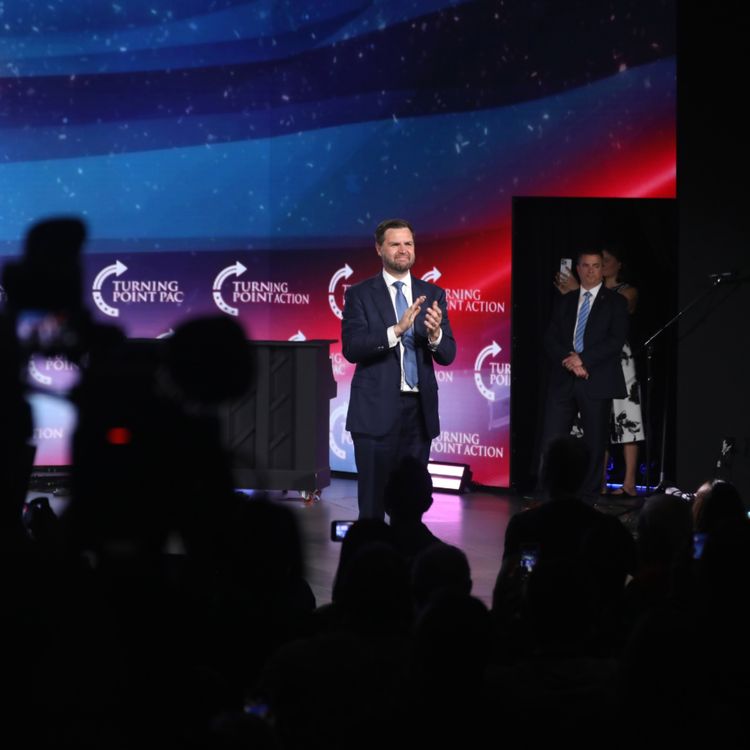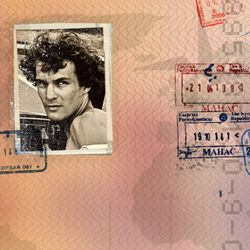Share

Transforming Society podcast
Viral masculinity and the far right: Karen Lee Ashcraft on gender in the US Election
As the US election approaches, MSNBC notes that the question of “what it means to be a man” is now a defining theme. In this episode, Jess Miles and Karen Lee Ashcraft revisit Karen's concept of 'viral masculinity' — a powerful current of aggrieved manhood fuelling far-right ideologies worldwide.
They explore the manosphere, the online ecosystem where this resentment takes root, analysing how figures like JD Vance and Andrew Tate tap into youthful discontent and guide it toward political extremism. Ashcraft argues that, much like a public health crisis, the rapid spread of aggrieved masculinity affects society at every level, shaping policies, identities and even environmental stances.
Offering tools for positive change, Karen discusses her concepts of 'lateral empathy' and 'critical feeling' as an alternative approach to defusing the far-right’s emotional momentum.
Karen Lee Ashcraft is Professor of Communication at the University of Colorado Boulder. She grew up in the lap of evangelical populism, and her research examines how gender interacts with race, class, sexuality, and more to shape organizational and cultural politics.
Find out more about the book at: https://bristoluniversitypress.co.uk/wronged-and-dangerous
The full transcript of the podcast is available here: https://www.transformingsociety.co.uk/2024/10/29/podcast-viral-masculinity-and-the-far-right-karen-lee-ashcraft-on-gender-in-the-us-election/
Timestamps:
01:19 - Why do we need to consider gender when talking about the rise of populism?
08:26 - How do you get from the manosphere to voting and politics?
15:23 - How do you explain female far right leaders like Giorgia Meloni and Marine Le Pen?
22:08 - Why is it important to envision the feeling of aggrieved manhood?
24:14 - Why do you see aggrieved manhood as a public health problem?
35:49 - What's the problem with feeling and emotion being ignored in many contexts?
40:05 - How do individuals like JD Vance represent this viral masculinity?
48:25 - What is lateral empathy, and why is it an important tool?
56:11 - What are you working on now and what are your plans?
Intro music:
Cold by yoitrax | @yoitrax
Music promoted by www.free-stock-music.com
Creative Commons Attribution 3.0 Unported License
creativecommons.org/licenses/by/3.0/deed.en_US
Follow the Transforming Society blog to be told when new articles and podcasts publish: https://www.transformingsociety.co.uk/follow-the-blog/
More episodes
View all episodes

PODCAST: How economics left the real world behind
50:00|Modern economics often credits Adam Smith as its cornerstone, but another key figure, David Ricardo, has shaped our world in ways we rarely examine. Ricardo, the wealthiest stock trader of his day, developed the theory of comparative advantage, a concept that helped justify globalisation but concealed deeper ties to power, empire and slavery.In this episode, Jess Miles speaks to Nat Dyer, author of Ricardo's Dream: How Economists Forgot the Real World and Led Us Astray. They unpack Ricardo’s legacy, from his famous theory involving English cloth and Portuguese wine to its surprising connections to the welfare state. They also explore why abstract economic models, despite their flaws and potential for manipulation, remain so dominant in shaping policies today.Nat Dyer is a Fellow of the Schumacher Institute, the Royal Society of Arts (RSA) and the Bath Royal Literary and Scientific Institution (BRSLI). Find out more about the book at: https://bristoluniversitypress.co.uk/trade/ricardos-dreamThe full transcript of the podcast is available here: [TBA]Timestamps:01:12 - What's your background, and why did you write the book?03:12 - Was David Ricardo, and what was his dream?08:42 - What is the example of English cloth and Portuguese wine?18:02 - How was his theory able to become so influential?22:16 - What does having this idealised view of economics mean for individuals?29:25 - What's the relationship between Ricardo's legacy and the welfare state?33:29 - How have these abstract theories contributed to climate change?37:22 - Why do we trust, and defend, these models?40:11 - What ideas are coming through to challenge these models?45:08 - How do you feel about David Ricardo?47:30 - What are you working on now?Intro music:Cold by yoitrax | @yoitraxMusic promoted by www.free-stock-music.com Creative Commons Attribution 3.0 Unported Licensecreativecommons.org/licenses/by/3.0/deed.en_USFollow the Transforming Society blog to be told when new articles and podcasts publish: https://www.transformingsociety.co.uk/follow-the-blog/
The problem with counterterrorism
36:37|The budget and resources that have been dedicated to combatting terrorism this century are staggering. But has it worked?In this episode, George Miller talks to Leonie B. Jackson, author of 'What is Counterterrorism for?', about the exceptional measures that states have taken in recent decades – such as detention without trial and targeted killing – in reaction to terrorist threats which they often portray as existential. When the terrorist spectacularly demonstrates that the state has failed to protect its citizens, Leonie explains, there’s an all-too-familiar recourse on the part of the state to put its response on a military footing.Leonie B Jackson is a Senior Lecturer in International Relations at Northumbria University and an editor of the journal Critical Studies on Terrorism.Find out more about the book at: https://bristoluniversitypress.co.uk/trade/what-is-counterterrorism-forThe full transcript of the podcast is available here: https://www.transformingsociety.co.uk/2024/11/12/podcast-the-problem-with-counterterrorism/Timestamps:01:15 - How did 9/11 and its aftermath play a role in your thinking about terrorism?02:24 - What was it that drew you to the field of counterterrorism in particular?06:48 - What are counterterrorism's animating questions or its concerns?08:03 - When did counterterrorism actually come on the agenda as something which merits very serious scrutiny?11:58 - What are the problems with the power counterterrorism grants?18:01 - How important is it to actually look at what works and what doesn't work within the field of counterterrorism? 21:38 - Do you see a great variety of counterterrorism approaches?24:35 - Do you think there's a public readiness to tolerate if not to embrace the things which have been done in the name of counterterrorism, especially in the last quarter of a century? 28:20 - Is there some way of reaching beyond the academic community and advancing this argument?Intro music:Cold by yoitrax | @yoitraxMusic promoted by www.free-stock-music.com Creative Commons Attribution 3.0 Unported Licensecreativecommons.org/licenses/by/3.0/deed.en_USFollow the Transforming Society blog to be told when new articles and podcasts publish: https://www.transformingsociety.co.uk/follow-the-blog/
What can business learn from the Moomins?
39:04|Generosity, rooted in love, courage and equality, shapes the Moomin ethos, underpinning not just the brand, but the business.In this episode, Jess Miles speaks with Paul Savage and Janne Tienari, co-authors of 'Moomin Management: Redefining Generosity', about what business can learn from Tove Jansson's beloved troll creatures.They discuss the Moomin principles for businesses around people management, strategic partnerships, digitisation and more, to create organisations that are kinder, curious and more successful.Paul Savage is Assistant Professor in Entrepreneurship at United Arab Emirates University. Janne Tienari is Professor of Management and Organisation at Hanken School of Economics.Find out more about the book at: https://bristoluniversitypress.co.uk/moomin-managementThe full transcript of the podcast is available here: https://www.transformingsociety.co.uk/2024/10/22/podcast-what-can-business-learn-from-the-moomins/Timestamps:01:15 - Who are the Moomins?01:55 - What's your involvement with the Moomin organisation?05:38 - Can you explain what the Moomin ecosystem looks like?09:19 - Did the Moomin characters or the business come first?10:50 - Can you talk about generosity and the Moomin business?16:52 - Does the ethos of generosity make things faster?19:56 - Can you tell us about the emotion, relationality and humour at Moomin?24:44 - Why are parties so important at Moomin?27:32 - What first steps can people take to be a bit more Moomin?30:34 - How would Moomin deal with challenges businesses are currently facing like hybrid working and AI?35:55 - What's the one thing you want people to take away from the book?Intro music:Cold by yoitrax | @yoitraxMusic promoted by www.free-stock-music.com Creative Commons Attribution 3.0 Unported Licensecreativecommons.org/licenses/by/3.0/deed.en_USFollow the Transforming Society blog to be told when new articles and podcasts publish: https://www.transformingsociety.co.uk/follow-the-blog/
The Black PhD experience
54:14|A compelling discussion on the challenges faced by Black PhD students in academia. Guests William Ackah and Madina Wane, co-editors of 'The Black PhD Experience', offer a nuanced exploration of the lived experiences of Black scholars.Through personal narratives the book examines systemic barriers, microaggressions, the psychological toll faced by Black students and the strategies they employ to persist.This episode offers valuable insights for educators, researchers and policymakers seeking to understand and address the urgent need for greater equity and inclusion in higher education.William Ackah is Senior Lecturer in Black and Community Geographies at Birkbeck, University of London. Madina Wane is a research scientist working in the biomedical sector and the co-founder of the non-profit organisation, Black In Immuno.Find out more about the book at: https://policy.bristoluniversitypress.co.uk/the-black-phd-student-experienceThe full transcript of the podcast is available here: https://www.transformingsociety.co.uk/2024/10/09/podcast-the-black-phd-experience/Read the Leading Routes report: https://leadingroutes.org/the-broken-pipelineTimestamps:1:06 - What are your stories and how did you come to edit the book?5:59 - Can you talk about the approach you've taken with the book?9:24 - In what ways are widening participation efforts in academia performative?14:26 - How do individual actions align with structural racism to influence the experience?19:00 - Can you speak about the drain of the PhD experience?25:40 - How do black scholars support each other? 35:25 - What fundamental shifts in thinking are needed in higher education to make change possible?40:17 - Can you talk about the 5 areas for specific action?49:22 - Can you talk about the fictional last chapter?Intro music:Cold by yoitrax | @yoitraxMusic promoted by www.free-stock-music.com Creative Commons Attribution 3.0 Unported Licensecreativecommons.org/licenses/by/3.0/deed.en_USFollow the Transforming Society blog to be told when new articles and podcasts publish: https://www.transformingsociety.co.uk/follow-the-blog/
Critical race theory and the search for truth
54:37|Critical race theory has been problematised and demonised over the years but it has great potential for societal change.In this episode, Richard Kemp speaks with Rodney D. Coates, author of 'Critical Race Theory and the Search for Truth', about what critical race theory is and why it has found itself in the crosshairs of white nationalists.They discuss the truths we often don't hear about the transatlantic slave trade, the discrepancy that was created between the Dominican Republic and Haiti, and why we need new dreamers to affect systemic change.Rodney D. Coates is Professor of Critical Race and Ethnic Studies at Miami University. He is a public sociologist engaged in critical race, social justice, social movements, social policy, and practice.Find out more about the book at: https://bristoluniversitypress.co.uk/critical-race-theory-and-the-search-for-truthThe full transcript of the podcast is available here: https://www.transformingsociety.co.uk/2024/09/24/podcast-critical-race-theory-and-the-search-for-truth/Timestamps:1:04 - What is critical race theory, and why has it ended up in the crosshairs of white nationalists? 6:45 - How did European nations explain away the transatlantic slave trade and was there a last effect?13:25 - Were European nations doing slavery differently than we'd seen before?24:04 - What happened to cause the discrepancy between Haiti and the Dominican Republic?30:20 - What racist systems of injustice met people who were part of the Great Migration in the US?34:53 - What's behind the attack on education with regards to critical race theory and what are their goals? 39:43 - Who benefits from stopping education on critical race theory?44:57 - How dangerous is the angry black woman trope in society? 51:08 - How can new dreams, and new dreamers, translate to systemic change?53:26 - Where can we find you online?Intro music:Cold by yoitrax | @yoitraxMusic promoted by www.free-stock-music.com Creative Commons Attribution 3.0 Unported Licensecreativecommons.org/licenses/by/3.0/deed.en_USFollow the Transforming Society blog to be told when new articles and podcasts publish: https://www.transformingsociety.co.uk/follow-the-blog/
Modern Slavery in Society
30:00|Despite economic development, modern slavery persists all around the world. The issue is not only one of crime but the regulation of the economy, better welfare, and social protections.In this episode, Richard Kemp speaks with Sylvia Walby and Karen Shire, authors of 'Trafficking Chains: Modern Slavery in Society', about this growing global issue.They discuss what trafficking chains are, how the forces of colonialism, capitalism and gender regimes affect modern slavery, and what changes are needed to correct our course.Sylvia Walby OBE is Professor of Criminology at Royal Holloway, University of London. She is Fellow of the British Academy, Fellow the UK Academy of Arts and Social Sciences, and Co-President of International Sociological Association’s TG11 on Violence and Society.Karen A. Shire is Professor of Comparative Sociology at the University of Duisburg-Essen, Germany. She is a Member of the International Max-Planck Research School on the Social and Political Constitution of the Economy, and President of International Sociological Association RC02 Economy and Society.Find out more about the book at: https://bristoluniversitypress.co.uk/trafficking-chainsThe full transcript of the podcast is available here: https://www.transformingsociety.co.uk/2024/09/04/podcast-modern-slavery-in-society/Timestamps:01:25 - What is a trafficking chain?03:57 - Can you explain the main forces of inequality and how they affect one another?07:01 - Do we need consistency in law worldwide and what damage has this inconsistency already caused?11:59 - How difficult is it to gain a true picture of trafficking and modern slavery?14:30 - Can financial figures around trafficking help reach people who are anti-immigration?17:39 - What results do we see from the different sexual exploitation policies around the world?23:32 - Will this suffering continue as long as people are individualised and not supported as a group?26:47 - How does modern slavery shape the nature of our society and what changes are needed to correct our course?29:08 - Where can people find you online?Intro music:Cold by yoitrax | @yoitraxMusic promoted by www.free-stock-music.com Creative Commons Attribution 3.0 Unported Licensecreativecommons.org/licenses/by/3.0/deed.en_USFollow the Transforming Society blog to be told when new articles and podcasts publish: https://www.transformingsociety.co.uk/follow-the-blog/
What diplomacy means in the real world
40:13|The life of a diplomat may seem far flung and unrelatable but, beyond the cocktails and canapes, there are ideas that can help us understand and work on social issues, such as increasing polarisation, and lessons to help us support ourselves.In this episode, Leigh Turner, author of 'Lessons in Diplomacy’ and former British ambassador who led posts in Ukraine, Turkey and Austria, talks about the lessons we all can learn from diplomacy.He divulges anecdotes from his career, looks at how diplomacy is changing and shares tips on how to overcome fear of the other and stay grounded in crisis situations.Leigh Turner is a former British ambassador who recently retired from the Foreign Office. Multilingual, he held diplomatic posts in Vienna, Moscow and Berlin, served as Ambassador to Ukraine, British Consul-General in Istanbul, Ambassador to Austria and UK Permanent Representative to the United Nations in Vienna, and Director of Overseas Territories in the FO. He has also written several political thrillers. Follow him on Twitter: @RLeighTurnerFind out more about the book at: https://policy.bristoluniversitypress.co.uk/trade/lessons-in-diplomacyThe full transcript of the podcast is available here: https://www.transformingsociety.co.uk/2024/08/20/podcast-what-diplomacy-means-in-the-real-world/Browse the photo gallery: https://photos.google.com/share/AF1QipPJhpovCMttEde2QvKGvYvMqghvXHs7eHCiznVJlD0obfCi3npjDDwtV6QwZhYApw?key=YUFmekRaQldBd2wtT0xOWEFyWFp3eWVZMnpvQWFRTimestamps:1:14 - How did you become a diplomat and why did you want to write the book?3:42 - Can you tell us some stories from your career?6:21 - What would happen if there wasn't diplomatic immunity?9:47 - Who did you write the book for?13:17 - How does the book teach us about how the world works?20:33 - Is the spreading out of power a good thing?21:51 - What can diplomacy teach us about overcoming 'fear of the other'?27:36 - What is your advice for staying grounded and calm during a crisis?32:46 - What does the future of diplomacy look like?37:28 - What are your plans for the future?Intro music:Cold by yoitrax | @yoitraxMusic promoted by www.free-stock-music.com Creative Commons Attribution 3.0 Unported Licensecreativecommons.org/licenses/by/3.0/deed.en_USFollow the Transforming Society blog to be told when new articles and podcasts publish: https://www.transformingsociety.co.uk/follow-the-blog/
‘The Olympics are political through and through’
32:12|In the late 19th century, a French aristocrat came up with the idea of reviving the sporting contests that took place at Olympia in ancient Greece, and so the modern Olympics were born. The games have gone on to become one of the greatest spectacles on earth, but have never been free of controversy.Our guest in this episode of the podcast is Jules Boykoff, a political scientist at Pacific University, Oregon (and avowed sports fan), who has spent years investigating the impact of the Olympics on athletes, communities and host cities. Jules tells us, ‘Olympians to show their stuff on the global stage and for us to all stand in admiration. But I wrote What Are the Olympics For? to be a book for the critical, thinking sports fan who cares about sports or is interested in the Olympics, but really wants to see what's going on behind the scenes and understand the full complexity of the Olympics. So in the book, I try to celebrate athletes while at the same time critiquing those who make it more difficult for them to succeed.’Jules Boykoff is a professor of politics and government at Pacific University in Forest Grove, Oregon. His writing on the connection between politics and sport have appeared in the New York Times, the Guardian, the Nation, the Los Angeles Times and New Left Review. He is also a former professional soccer player who represented the US U-23 men’s national team in international competition. Follow him on Twitter: @JulesBoykoffFind out more about the book at: https://bristoluniversitypress.co.uk/trade/what-are-the-olympics-forThe full transcript of the podcast is available here: https://www.transformingsociety.co.uk/2024/08/01/podcast-the-olympics-are-political-through-and-through/Timestamps:1:31 - When did the Olympics first make an impression on you, and what was that like?3:08 - What is the contrast between that 8 or 9-year-old you being excited by the Winter Olympics in 1980 and the you who's heading off to Paris?5:02 - Why does the question of what the Olympics are for matter?6:54 - How important is it to understand the nature of the IOC?12:53 - Has politics always been part of sport and the Olympics?16:18 - Does the Olympics bring genuine, long-lasting benefits for the wider community in the host cities?19:25 - Would we be going too far to say that the Olympics need cities more than cities need the Olympics? 21:14 - Are things happening that make you feel positive about the possibility of change?23:59 - Are there ever moments when you just think pulling it off just cannot be done without downsides?26:44 - Do you see the athletes as being absolutely key to positive changes?29:29 - What is your favorite piece of Olympic history or trivia or lore? Intro music:Cold by yoitrax | @yoitraxMusic promoted by www.free-stock-music.com Creative Commons Attribution 3.0 Unported Licensecreativecommons.org/licenses/by/3.0/deed.en_USFollow the Transforming Society blog to be told when new articles and podcasts publish: https://www.transformingsociety.co.uk/follow-the-blog/